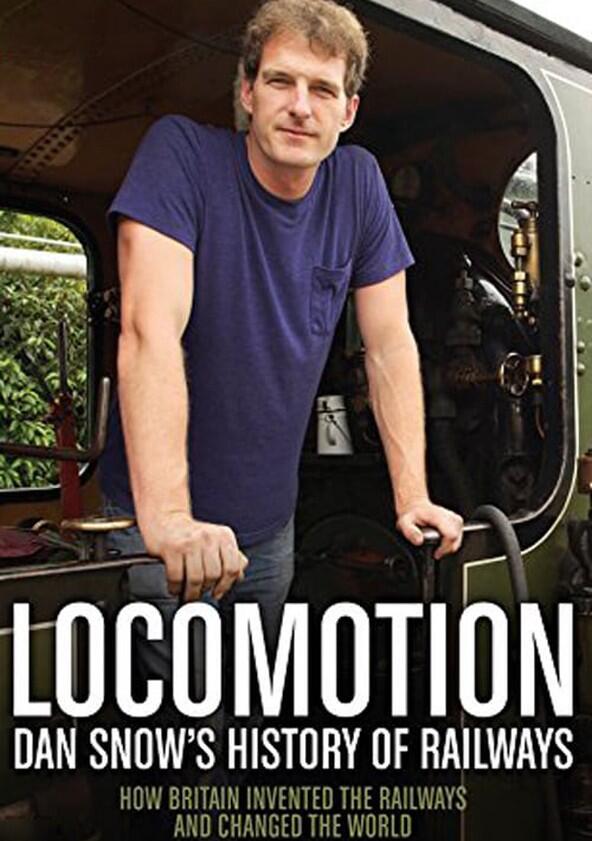Locomotion: Dan Snow's History of Railways - Season 1

Season 1

Episodes

Episode 1
From their beginnings as a primitive system of track-ways for coal carts in the early 18th century, railways quickly developed into the driving force behind the industrial revolution and the pivotal technology for modern Britain, and a connected world.
Rapid industrial growth during the early 19th century, coupled with the prospect of vast profits, drove inventors and entrepreneurs to develop steam locomotives, metal tracks and an array of daring tunnels, cuttings and bridges that created a nationwide system of railways in just 30 years.
George Stephenson's Liverpool and Manchester Railway became the model for future inter-city travel for the next century and his fast, reliable locomotive, The Rocket, began a quest for speed that has defined our modern world.

Episode 2
In the late 1830s, the railways arrived in London and linked the capital to Birmingham, Liverpool and Manchester. This was the start of a truly national network - and one of the greatest civil engineering projects in history.
The spread of the railways triggered a mania across Britain. Railway tycoons like Samuel Morton Peto and George Hudson made and lost fortunes as the stock markets boomed around these new developments. Yet the bubble burst in 1847 and shares plummeted. Thousands of ordinary shareholders filled the bankruptcy courts. However as Dan Snow reveals, the legacy of the mania was an incredible rail network for 19th-century Britain and a revolution in the way people lived.

Episode 3
Over just 50 years, Britain's railways grew from a handful of small lines carrying coal to the biggest industry in the strongest nation on the planet. A nation had built the railways and now those railways would build a nation, influencing working conditions for its employees, proving a valuable export across the globe and even changing warfare.
Yet the story of railways up until the beginning of the Second World War concerned who they really belonged to - the private rail companies who were obsessed with profit, the public who rode them, or the government, who needed them at times of crisis but was reluctant to regulate.
Recently Updated Shows

NCIS
NCIS (Naval Criminal Investigative Service) is more than just an action drama. With liberal doses of humor, it's a show that focuses on the sometimes complex and always amusing dynamics of a team forced to work together in high-stress situations. Leroy Jethro Gibbs, a former Marine gunnery sergeant, whose skills as an investigator are unmatched, leads this troupe of colorful personalities. Rounding out the team are Anthony DiNozzo, an ex-homicide detective whose instincts in the field are unparalleled and whose quick wit and humorous take on life make him a team favorite; the youthful and energetic forensic specialist Abby Sciuto, a talented scientist whose sharp mind matches her Goth style and eclectic tastes; Caitlin Todd, an ex-Secret Service Agent; and Timothy McGee, an MIT graduate whose brilliance with computers far overshadows his insecurities in the field; Assisting the team is medical examiner Dr. Donald "Ducky" Mallard, who knows it all because he's seen it all, and he's not afraid to let you know. From murder and espionage to terrorism and stolen submarines, these special agents travel the globe to investigate all crimes with Navy or Marine Corps ties.

Landman
Set in the proverbial boomtowns of West Texas, Landman is a modern day tale of fortune seeking in the world of oil rigs. The series is an upstairs/downstairs story of roughnecks and wildcat billionaires fueling a boom so big, it's reshaping our climate, our economy and our geopolitics.

The Creep Tapes
Based on a collection of videotapes in the secret vault of the world's deadliest and most socially uncomfortable serial killer, who hires his victims to film him for the day under false pretenses, each episode exposes a new victim from one of the fabled 'Creep Tapes'.

America's Funniest Home Videos
ABC's longest-running primetime entertainment show, America's Funniest Home Videos, returns for season 36 this fall with the same mission -- giving families something genuinely funny to enjoy together on Sunday nights.
"AFV," the longest-running primetime entertainment show in ABC history, returns for season 36 with the same mission - to provide viewers with hysterical moments that fly by at a dizzying pace.

The Real Housewives of Potomac
Just up the river from our nation's capital lies a hidden gem—Potomac, Maryland. Its rolling hills, gated mansions, sophisticated prep schools, and exclusive country clubs all serve to keep the area invitation-only. Sprinkled throughout this community are a handful of old-line, wealthy African-American families who have historically broken racial barriers to provide a life of privilege for their children. The Real Housewives of Potomac follows the upscale lives of six intriguing, well-to-do women: Gizelle Bryant, Katie Rost, Karen Huger, Charrisse Jackson-Jordan, Robyn Dixon, and Ashley Darby, all of whom have fought for their places in this society by way of legacy or marriage. In a town where entry is granted only through class, pedigree, and lineage, how far will these ladies go to secure their spot at the top of this prestigious circle?